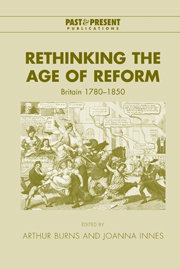Book contents
- Frontmatter
- Contents
- Notes on contributors
- Preface
- List of abbreviations
- 1 Introduction
- 2 ‘Reform’ in English public life: the fortunes of a word
- 3 Parliament, the state, and ‘Old Corruption’: conceptualizing reform, c. 1790–1832
- 4 ‘Old wine in new bottles’: the concept and practice of law reform, c. 1780–1830
- 5 English ‘church reform’ revisited, 1780–1840
- 6 Medicine in the age of reform
- 7 British antislavery reassessed
- 8 ‘The age of physiological reformers’: rethinking gender and domesticity in the age of reform
- 9 Reforming the aristocracy: opera and elite culture, 1780–1860
- 10 Reform on the London stage
- 11 Reforming culture: national art institutions in the age of reform
- 12 Irish reform between the 1798 Rebellion and the Great Famine
- 13 Empire and parliamentary reform: the 1832 Reform Act revisited
- 14 Reforms, movements for reform, and possibilities of reform: comparing Britain and continental Europe
- Index
- Past and Present Publications
13 - Empire and parliamentary reform: the 1832 Reform Act revisited
Published online by Cambridge University Press: 15 December 2009
- Frontmatter
- Contents
- Notes on contributors
- Preface
- List of abbreviations
- 1 Introduction
- 2 ‘Reform’ in English public life: the fortunes of a word
- 3 Parliament, the state, and ‘Old Corruption’: conceptualizing reform, c. 1790–1832
- 4 ‘Old wine in new bottles’: the concept and practice of law reform, c. 1780–1830
- 5 English ‘church reform’ revisited, 1780–1840
- 6 Medicine in the age of reform
- 7 British antislavery reassessed
- 8 ‘The age of physiological reformers’: rethinking gender and domesticity in the age of reform
- 9 Reforming the aristocracy: opera and elite culture, 1780–1860
- 10 Reform on the London stage
- 11 Reforming culture: national art institutions in the age of reform
- 12 Irish reform between the 1798 Rebellion and the Great Famine
- 13 Empire and parliamentary reform: the 1832 Reform Act revisited
- 14 Reforms, movements for reform, and possibilities of reform: comparing Britain and continental Europe
- Index
- Past and Present Publications
Summary
The 1832 Reform Act enfranchised around half a million men in Britain and Ireland. By abolishing the small nomination boroughs, according to its critics, it disfranchised many millions more across the British empire. ‘How far’, asked Sir Robert Inglis, making the first opposition speech in the Commons against the Reform Bill, ‘the rights of distant dependencies, of the East Indies, of the West Indies, of the Colonies … could find their just support in the House, I know not.’ Other Tory opponents were more specific. Sir Richard Vyvyan reckoned the Reform Bill would create a ‘tyrannical assembly’ over 120 million in the colonial empire unless small boroughs remained open to men with imperial experience and interests. Michael Sadler thought ‘scores of millions’ in ‘this extensive empire’ would be left unrepresented. And Sir John Malcolm feared that 80 million people in India ‘would not find one Representative in the British Parliament’. Writing in Blackwood's Edinburgh Magazine in May 1831, Archibald Alison summed up the Tory case against the imperial deficiencies of the Whig reform bill: ‘[n]ominally professing to extend, this bill is really destined to contract, the representation, to base the legislature, not upon the empire, but the island’. Without adequate representation, Tories believed that the empire – that is, the union with Ireland, the protected trade of India and Canada, and the plantation economies of the West Indies – would be lost, and, in the words of the earl of Falmouth, ‘[t]his great State would be divided into several small Republics, which would probably soon become the provinces of some greater Power’.
- Type
- Chapter
- Information
- Rethinking the Age of ReformBritain 1780–1850, pp. 295 - 311Publisher: Cambridge University PressPrint publication year: 2003
- 11
- Cited by



